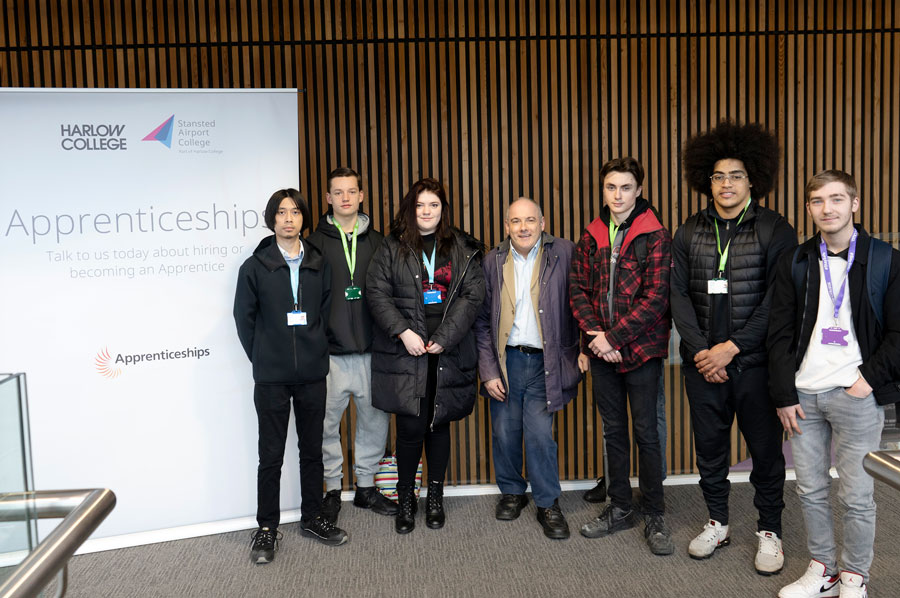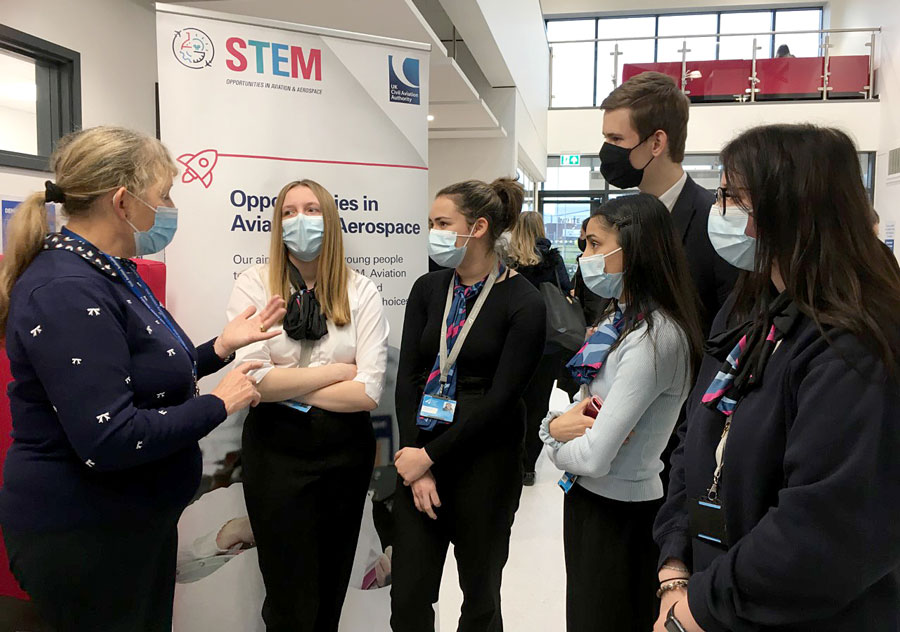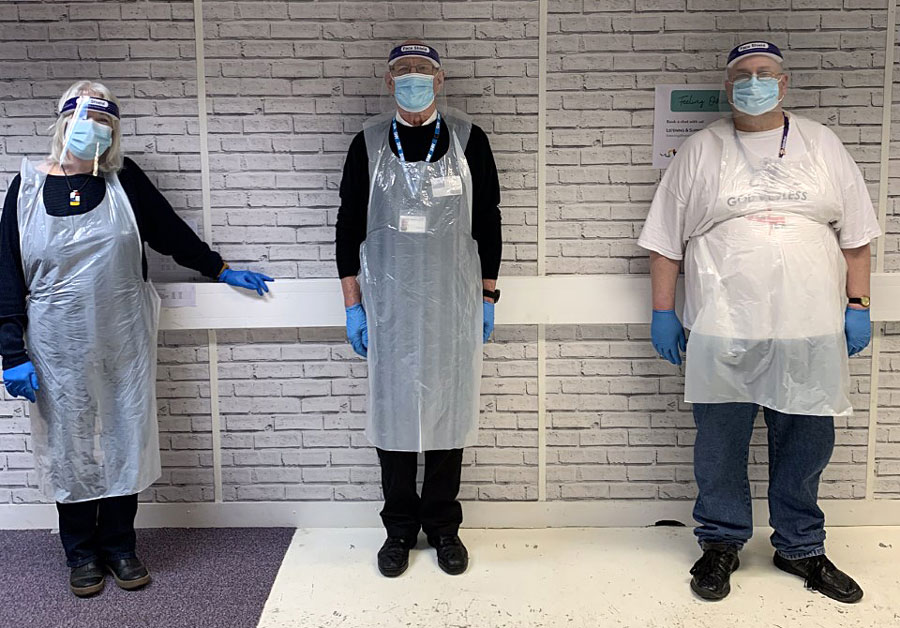
To kick-start celebrations for National Apprenticeship Week, which takes place across England from 7th-13th February, Robert Halfon, MP for Harlow and Chair of the Education Select Committee, met with new apprentices at Harlow College where he gave an impassioned talk on the merits of apprenticeships and their value to both employers and the economy.

Stansted Airport College celebrated International Civil Aviation Day by hosting a networking event where students had the opportunity to talk to specially invited aviation organisations about work experience and career opportunities.
International Civil Aviation Day is an annual event recognising aviation’s vital role in boosting global, social and economic development, of connecting the world, and bringing untold new and exciting opportunities to millions of people.
As well as finding out about careers in the industry, students were able to discover more about the organisations in detail and understand what they do. Organisations who attended included the Civil Aviation Authority, the Royal Aeronautical Society, London Stansted Airport (MAG), Harrods Aviation and Ryanair.
Aviation Operations student Pharrell described why the event was worthwhile. “I want to become a pilot and this event has given me a much better insight into the different pathways available. It’s harder to find this type of information online so to hear it first hand from someone who works in the industry has really opened my eyes to what I could be.”
Holly, also studying Aviation Operations, was equally enthusiastic. “I found it really interesting talking to Harrods Aviation – I didn’t really know what they did but after speaking to them I’ll definitely be applying for a role. I think it’s very important to have the opportunity to meet with these organisations, otherwise you don’t always get to hear about the opportunities that are available. I’ve got so many contacts from today, all for different jobs and work experience that I could be applying for.”
Nick Davis is the Education, Skills and Diversity Manager at the Royal Aeronautical Society. “We try to inspire future generations into aerospace and aviation careers. It’s really important for us to talk with young people about the opportunities available in our sectors. It’s been a tough 18 months but the industry is very resilient and there will be lots of opportunities in the sector, including many brand-new opportunities. It’s a very rewarding, inspirational and future thinking industry.”
Emily Cottrell and Sharon Nicholson were representing the Civil Aviation Authority, who oversee safety regulations within the aviation sector. Emily: “The aviation industry has had a tough time recently but it does tend to be cyclic and every time it comes back it tends to come back stronger, so the jobs will be there. Sharon: “Today has been really good as we’ve been able to network with other organisations. Everyone has been amazing, there’s been a great atmosphere and the students have been really involved.”
Alex Smith is the Education Coordinator at London Stansted Airport. “I work quite closely with everyone here at the college so I do get a lot of time to interact with the students and I’ve been really impressed with the level of interest they’ve shown today. I think they’re really awake to the opportunities that are available at the Airport currently and looking ahead, as the industry starts to recover. I was delighted to promote hundreds of exciting roles currently available at the airport across several sectors including hospitality, aviation and cargo. It’s been great today just to talk with students to make them aware of what’s available over the other side of the runway.”
Victoria Claydensmith, Deputy Head of Stansted Airport College, said “Stansted Airport College is delighted to be hosting this event to mark International Civil Aviation Day 2021. The day celebrates the importance of civil aviation and recognises the role aviation plays in the global transit network.
The event offers our students a unique opportunity to network with organisations from the aviation industry, expand their knowledge and find out information about careers and governing bodies.”

As part of the ongoing work to tackle knife crime in the county, officers from Stansted Airport Tactical and Community Police Team joined staff at Stansted Airport College to raise awareness around the dangers of knife crime to prevent students from carrying knives.
On Tuesday 28 September, a knife arch was set up at the main entrance to screen students as they entered the campus. Officers and staff carrying out the screenings were fully compliant with current Covid-19 restrictions including the wearing of face masks and observing safe social distancing. Between 7.30 and 9.30 around 200 students came through the arch and no suspicious items were found.
At this time of year the focus is traditionally on A Level and GCSE results, but thousands of vocational learners at Stansted Airport College and Harlow College have been achieving excellent results, despite having to study under incredibly challenging circumstances due to the ongoing coronavirus pandemic and subsequent lockdowns.
A former Stansted Airport College trainee has landed her dream career by joining the RAF as an Air and Ground Steward

We were delighted to welcome back students onto both our Harlow and Stansted Airport College campuses from 8th March as part of the government’s roadmap out of lockdown, although this did present us with the challenge of how to safely administer up to 3,000 Covid-19 tests for students, many of whom would have been naturally anxious about returning to classes after such a long period in lockdown.

A Stansted Airport College student, whose usual coach route to college was cancelled due to covid-19, was so determined to get to his first face-to-face lesson in over three months that he took to his bike and cycled the 32 miles from his home in Ilford to attend class.

To mark British Science Week, this year the organisers decided to do a bit of digging to find out more about how parents and young people are feeling about their futures. As the past twelve months has demonstrated, science is a fundamental part of our lives and has an impact on everyone’s day-to-day, especially now.
Stansted Airport College observed the Armistice Day two minutes silence at 11:00 on Wednesday 11 November.
Here's a lovely video created by Engineering students Joseph Donovan and Tiegan Crisp



